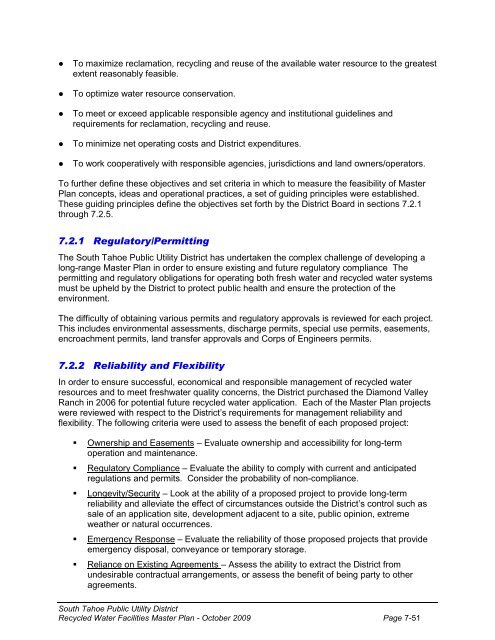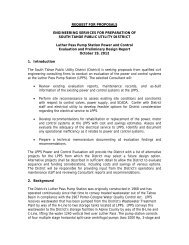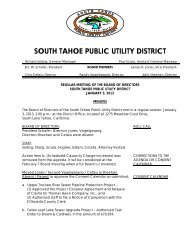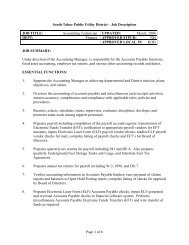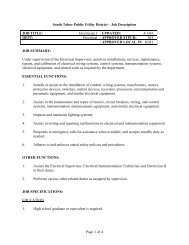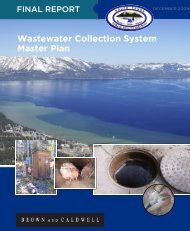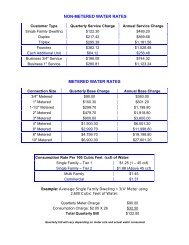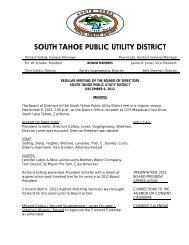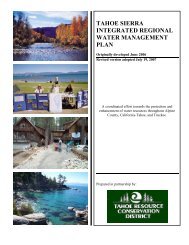October 2009 - South Tahoe Public Utility District
October 2009 - South Tahoe Public Utility District
October 2009 - South Tahoe Public Utility District
Create successful ePaper yourself
Turn your PDF publications into a flip-book with our unique Google optimized e-Paper software.
●<br />
●<br />
●<br />
●<br />
●<br />
To maximize reclamation, recycling and reuse of the available water resource to the greatest<br />
extent reasonably feasible.<br />
To optimize water resource conservation.<br />
To meet or exceed applicable responsible agency and institutional guidelines and<br />
requirements for reclamation, recycling and reuse.<br />
To minimize net operating costs and <strong>District</strong> expenditures.<br />
To work cooperatively with responsible agencies, jurisdictions and land owners/operators.<br />
To further define these objectives and set criteria in which to measure the feasibility of Master<br />
Plan concepts, ideas and operational practices, a set of guiding principles were established.<br />
These guiding principles define the objectives set forth by the <strong>District</strong> Board in sections 7.2.1<br />
through 7.2.5.<br />
7.2.1 Regulatory/Permitting<br />
The <strong>South</strong> <strong>Tahoe</strong> <strong>Public</strong> <strong>Utility</strong> <strong>District</strong> has undertaken the complex challenge of developing a<br />
long-range Master Plan in order to ensure existing and future regulatory compliance The<br />
permitting and regulatory obligations for operating both fresh water and recycled water systems<br />
must be upheld by the <strong>District</strong> to protect public health and ensure the protection of the<br />
environment.<br />
The difficulty of obtaining various permits and regulatory approvals is reviewed for each project.<br />
This includes environmental assessments, discharge permits, special use permits, easements,<br />
encroachment permits, land transfer approvals and Corps of Engineers permits.<br />
7.2.2 Reliability and Flexibility<br />
In order to ensure successful, economical and responsible management of recycled water<br />
resources and to meet freshwater quality concerns, the <strong>District</strong> purchased the Diamond Valley<br />
Ranch in 2006 for potential future recycled water application. Each of the Master Plan projects<br />
were reviewed with respect to the <strong>District</strong>‟s requirements for management reliability and<br />
flexibility. The following criteria were used to assess the benefit of each proposed project:<br />
• Ownership and Easements – Evaluate ownership and accessibility for long-term<br />
operation and maintenance.<br />
• Regulatory Compliance – Evaluate the ability to comply with current and anticipated<br />
regulations and permits. Consider the probability of non-compliance.<br />
• Longevity/Security – Look at the ability of a proposed project to provide long-term<br />
reliability and alleviate the effect of circumstances outside the <strong>District</strong>‟s control such as<br />
sale of an application site, development adjacent to a site, public opinion, extreme<br />
weather or natural occurrences.<br />
• Emergency Response – Evaluate the reliability of those proposed projects that provide<br />
emergency disposal, conveyance or temporary storage.<br />
• Reliance on Existing Agreements – Assess the ability to extract the <strong>District</strong> from<br />
undesirable contractual arrangements, or assess the benefit of being party to other<br />
agreements.<br />
<strong>South</strong> <strong>Tahoe</strong> <strong>Public</strong> <strong>Utility</strong> <strong>District</strong><br />
Recycled Water Facilities Master Plan - <strong>October</strong> <strong>2009</strong> Page 7-51


